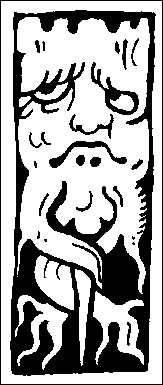Shall I
Know
You?
 It was on a stifling scale of its own. I stood and breathed in --- because one must breathe --- tar of ten thousand cigarettes, fat of ten thousand breakfasts, the leaking of metal seep of a thousand shaving cuts and the horse-chestnut whiff of nocturnal emissions. Each odour, ineradicable for a decade, had burrowed into the limp chintz of the curtains and into the scarlet carpet that ran up the narrow stairs.
It was on a stifling scale of its own. I stood and breathed in --- because one must breathe --- tar of ten thousand cigarettes, fat of ten thousand breakfasts, the leaking of metal seep of a thousand shaving cuts and the horse-chestnut whiff of nocturnal emissions. Each odour, ineradicable for a decade, had burrowed into the limp chintz of the curtains and into the scarlet carpet that ran up the narrow stairs.
From somewhere --- beyond a door, and another door --- there was a burst of male laughter. The door swung shut; the laughter ended in a wheeze, which trailed like another odour on the air. Then a hand reached for my bag. I looked down, and saw a small girl: a girl, I mean, in her late teens --- a person, diminutive and crooked, banging my bag against her thigh.
She looked up and smiled. She had a face of feral sweetness, its colour yellow; her eyes were long and dark, her mouth a taut bow, her nostrils upturned as if she were scenting the wind. Her neck seemed subject to a torsion: the muscles on the right side were contracted, as if some vast punitive hand had picked her up and taken her in a grip. Her body was tiny and twisted, one hip thrust out: one leg lame, one foot trailing. I saw this as she broke away from me, lugging my bag towards the stairs.
I rushed to catch up with her, wanting to drag [my bag] from her poor hand, only to realize that the scarlet stinking stairs shot steeply upwards, their risers deep enough to trip the unwary, and took a sharp twist which brought us to the first landing. "Up to the top," she said. She turned to smile over her shoulder. Her face swivelled to a hideous angle, almost to where the back of her head had been. With a fast, crab-wise scuttle, leaning on the side of her built-up shoe, she shot away towards the second floor.
She had lost me, left me behind. By that second landing, I was not in the race. As I began to climb to the third floor --- the stairs were now like a ladder, and the smell was more enclosed, and had clotted in my lungs --- I felt again the flash of the anger. "Only a few more," she called down. I stumbled up after her.
On a dark landing, she opened one door. The room was a sliver: not even a garret, but a bit of corridor blocked off. There was a sash window which rattled, and a spiritless divan with a brown cover, and a small brown chair with a plush buttoned back, which --- I saw at once --- had a grey rime of dust, like navel-fluff, accumulated behind each of its buttons. I felt sick, from this thought, and the climb. She turned to me, her head wobbling, her expression dubious. In the corner was a plastic tray, with a small electric kettle of yellowed plastic; yellowed wheat-ears decorated it. There was a cup. "All this is free," she said. "It is complimentary. It is included."
From The London Review of Books,
October 19, 2000